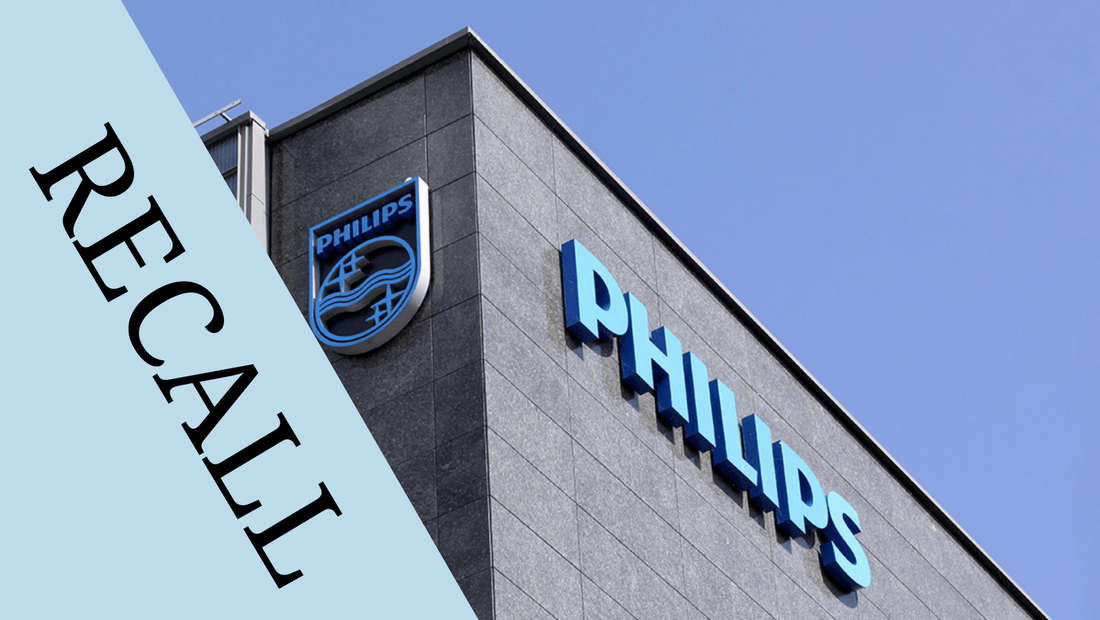
Philips Respironics Recall
Share

Due to FDA regulations, Philips Respironics announced a recall on June 14 of 2021, for certain Continuous Positive Airway Pressure (CPAP) machines, BiLevel Positive Airway Pressure (BiLevel PAP) machines, and mechanical ventilators over potential health risks posed by the polyester-based polyurethane (PER-PUR) foam used for sound abatement. This recall affects all machines manufactured before April 26 of 2021.
For those using the affected BiLevel PAP and CPAP machines, Philips does advise that you discontinue the use of your device and speak with your physician or medical device provider first to determine the best course of action for continued treatment.
What’s happening to the foam?
Said foam may degrade and the resulting particles or gases, called volatile organic compounds, could be inhaled or swallowed by the person using affected machines. According to the initial laboratory analysis performed by Philips, the breakdown might be exacerbated by the machines’ hot and humid settings, and by using ozone or ultraviolet (UV) light cleaners or other cleaning methods outside of the manufacturer’s recommendation.
Philips Respironics’ solution for the recall.
Following the recall, Philips Respironics developed a plan to repair affected machines by replacing the polyester-based polyurethane foam with silicone-based foam. If the machines cannot be repaired, Philips will replace them altogether. The FDA did originally approve of this plan, but additional information was later obtained regarding the silicone foam in similar devices sold outside of the US, wherein one safety test did not receive a pass. On the other hand, machines marketed inside the U.S. received acceptable results. Now, Philips has been asked to conduct additional tests via an independent laboratory. While this is ongoing, Philips will still move forward with the repair and replacement program in the U.S. and it should be completed by September of next year.
Symptoms to watch out for.
Philips Respironics released a list of potential health risks that are caused by the black, broken-down foam pieces or volatile organic compounds entering the device’s air tube.
Potential risks associated with exposure to degraded foam include:
- Irritation to the skin, eyes, nose, and respiratory tract (airway)
- Inflammatory response
- Headache
- Asthma
- Toxic or cancer-causing effects to organs.
The potential risks of exposure to chemical released include:
- Headache
- Dizziness
- Irritation in the eyes, nose, respiratory tract (airway), and skin
- Hypersensitivity reaction, such as an allergic reaction or another immune system reaction
- Nausea or vomiting
- Toxic and cancer-causing effects.
What does this all mean for first-time CPAP, BiPAP, and mechanical ventilator patients?
Be aware that there will be delays because Philips Respironics is currently not taking machine orders for new patients. Instead, the company is changing its production lines to focus on the repair and replacement of machines in the coming months. Meaning the market gap for first-time patients is largely being filled by ResMed. While ResMed is scrambling to increase production, there will still be delays due to the excess demand, slowdown of the global supply chain, and the new AirSense 11 release. In the name of fairness, ResMed has limited the amount machines each clinic is able to receive per month and the amount varies from month to month. Thus, the machine waitlist most clinics have in place for future allotments.
For those who are affected by the recall and would like to discuss treatment options with one of our trained and experienced clinicians on staff, please don’t hesitate to reach out via mobile or email.
For more information and a full list of recalled machines, please visit the Philips website here: Medical Device Recall Notification



